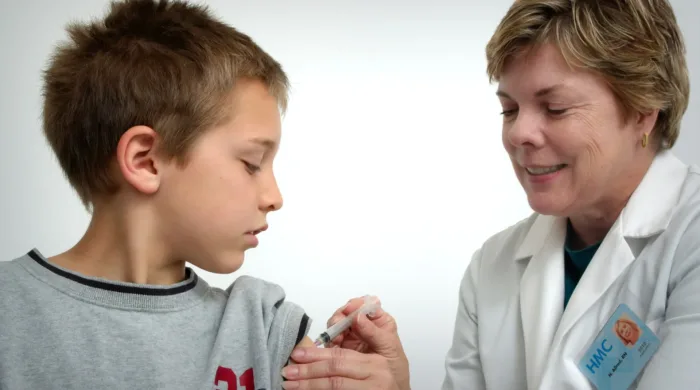August is National Immunization Awareness Month, so we’d like to take this opportunity to provide information about how vaccines work and why they’re so important. In this post, we’ll share what makes vaccines safe for your family; explain how they empower you to protect you and yours from preventable diseases; reaffirm the serious health threats posed by vaccine-preventable diseases; and recommend ways to keep your vaccine schedule up-to-date with doctors.
How Do Vaccines Work?
A vaccine is a chemical medicine, which contains a portion of the germs that cause the disease they were created to prevent. The germs used in the vaccine are too weak to cause sickness, but strong enough to initiate a reaction by your immune system to create antibodies to fight the disease from developing. Instead of suffering through a disease to build resistance, a vaccine provides an alternative that eliminates the ill effects. Vaccines are tested extensively—many times for years—before they’re approved for use, and then they’re monitored regularly upon release to ensure their safety.
There are several components to vaccines, but three of the most common include:
- Adjuvants, which boost the body’s response to the immunization.
- Stabilizers, which help preserve vaccines’
- Formaldehyde, which prevents bacterial contamination during the manufacturing process.
Portions of these ingredients are found in the body naturally or in other medicines and household items, and are proven to be safe for use. Mild side effects sometimes can occur in the days following a vaccination, but nothing as severe as the effects of the diseases that could result from not getting immunized.
It’s true there are some children who have not been vaccinated, who may not contract diseases like measles or mumps, but the guidelines suggest that it’s not worth the risk to take the chance. Illness from disease can cause debilitating pain, scarring, disabilities and even death in the most severe cases.
For additional peace of mind, families can also access individual Vaccine Information Statements that detail the disease the vaccine was created to prevent, what age(s) your children should be when they receive the vaccines and additional details about its use from the from the Centers for Disease Control and Prevention (CDC).
For a more visual journey of how vaccines work, check out the series of videos in this YouTube playlist, created by the Centers for Disease Control and Prevention.
Develop a Vaccine Schedule
It’s important that your children get all of the necessary immunizations in the time frame suggested by the CDC. For a basic guide, visit the CDC website, then work with your doctor to establish the right schedule for your family. Falling behind in doses can put your child and those they come in contact with at a greater risk for contracting disease. In addition, certain travel restrictions are in place when traveling internationally for those who are not caught up on their immunizations.
Well-child visits are also vital to keep current, especially since many appointments were canceled or postponed due to the Covid-19 pandemic. To read more about their importance, visit the Well-child Visits page on the CDC website.
For an in-depth look at vaccines and a helpful, printable guide you can take with you to your medical appointments, visit the Why Vaccinate? section of the CDC website.
Schedule an Appointment
To meet with a healthcare professional to develop an immunization schedule for your family, or if you are due for some of your vaccinations, request an appointment at one our Family Practice locations.
